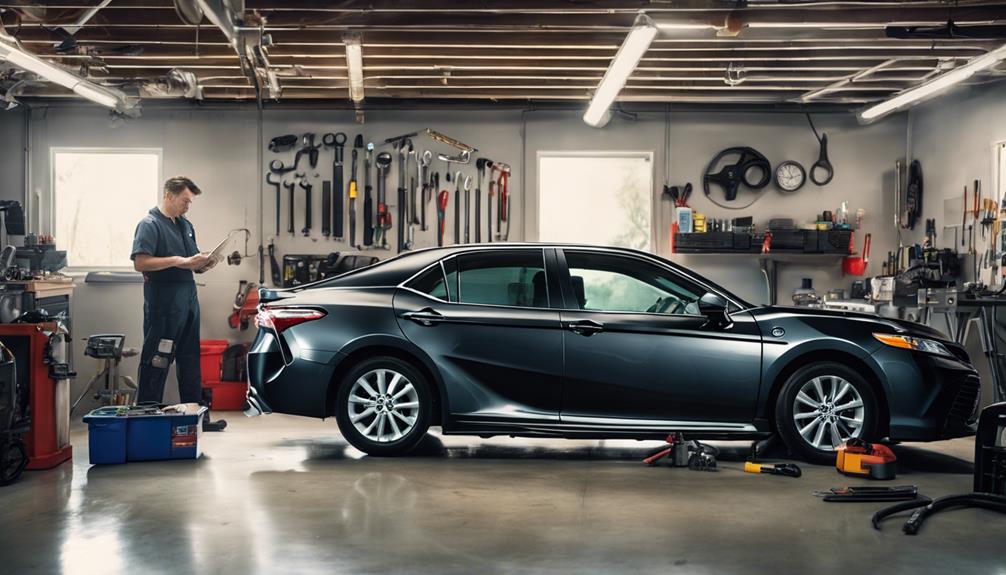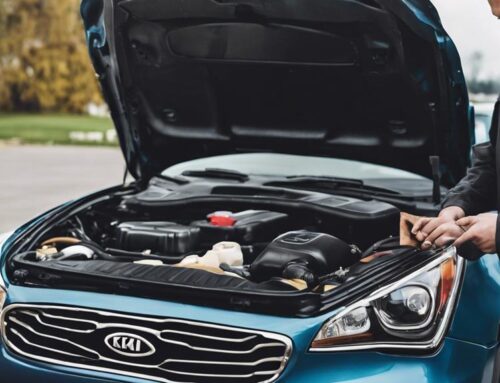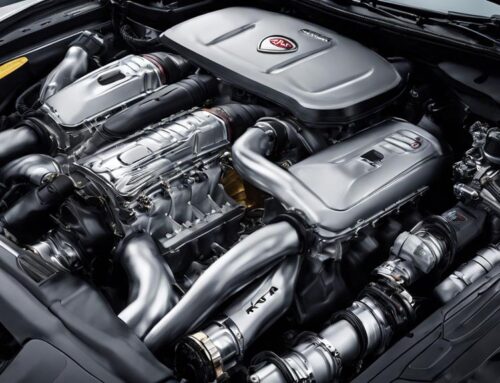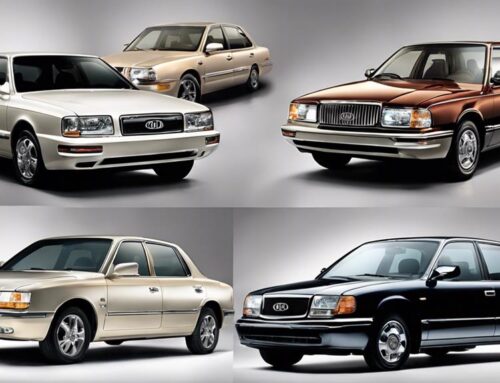Maintaining your Toyota Camry costs about $420 annually. Regular oil changes, every 5,000 to 10,000 miles, set you back $50 to $70. Tire rotations cost $20 to $50 and should be done every 5,000 to 7,500 miles. Don't skip fluid inspections to avoid pricier repairs. Brake service is necessary every 10,000 to 15,000 miles, with pads replaced every 30,000 to 50,000 miles. You'll also replace air filters every 15,000 to 30,000 miles and batteries every 3 to 5 years. Staying on top of these tasks keeps your Camry running smoothly and prevents costly issues down the line. For a deeper look, explore the details.
Key Takeaways
- Average annual maintenance cost for a Toyota Camry is approximately $420.
- Oil changes cost between $50 to $70 each, recommended every 5,000 to 10,000 miles.
- Tire rotations cost $20 to $50 per service, recommended every 5,000 to 7,500 miles.
- Brake pad replacement costs vary, with inspections every 10,000 to 15,000 miles and replacements every 30,000 to 50,000 miles.
- Air filter replacements cost $25 to $75, needed every 15,000 to 30,000 miles.
Oil Changes
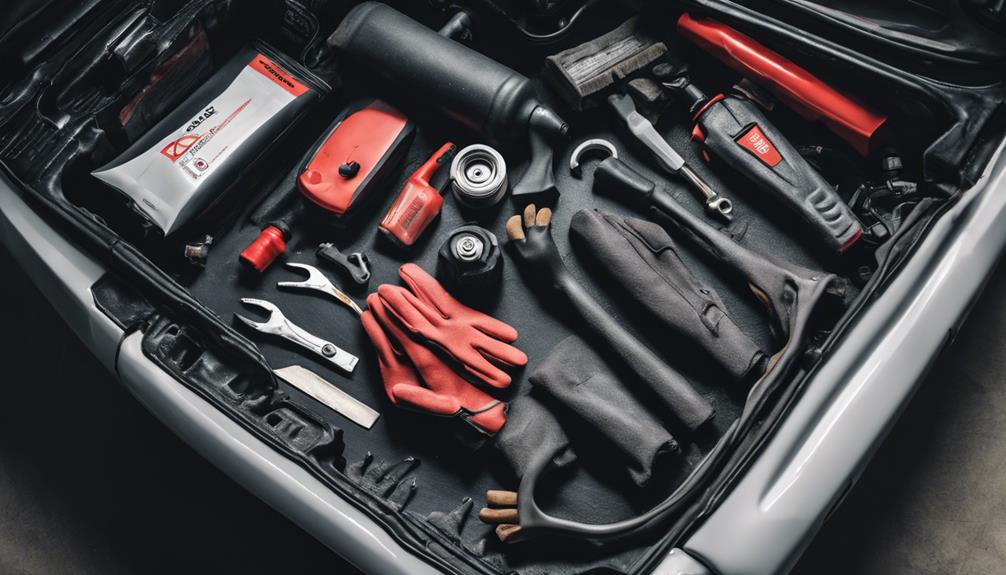
When it comes to maintaining your Toyota Camry, regular oil changes are essential for keeping the engine running smoothly. Think of it as giving your car a rejuvenating cup of coffee, but instead of caffeine, it's oil.
Toyota recommends you change the oil every 5,000 to 10,000 miles. The cost? Around $50 to $70, but hey, who's counting when it means avoiding a meltdown on the highway?
If you're feeling adventurous and want to save some bucks, DIY oil change kits cost about $25 to $35. Just remember, synthetic oil changes will cost a bit more, like ordering a fancy latte instead of regular joe.
Either way, your engine will thank you for the smooth ride.
Tire Rotations
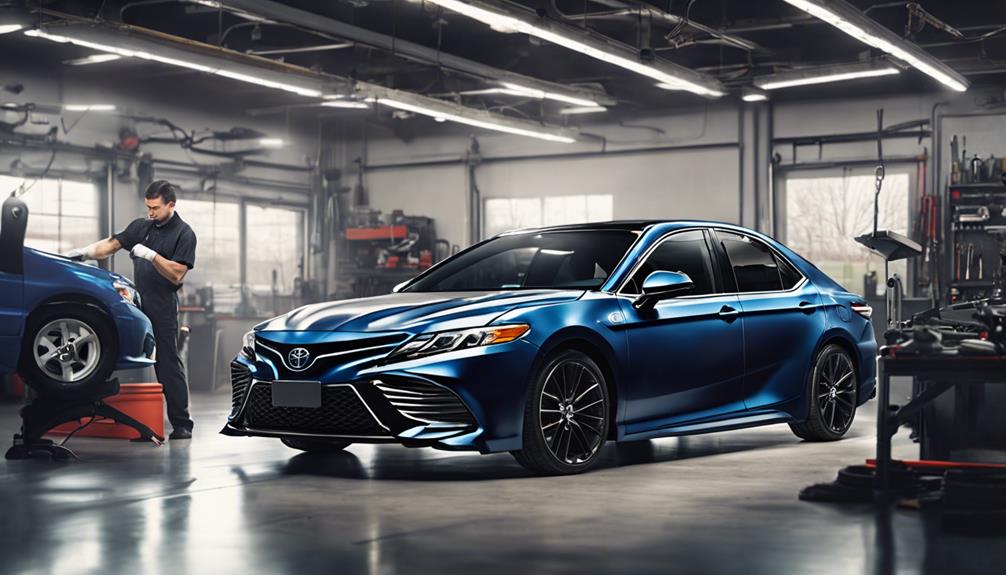
Regular tire rotations on your Toyota Camry promote even tread wear and enhance overall performance. Think of it as a spa day for your tires—they get pampered, and you get better fuel efficiency. Aim to rotate those rubber beauties every 5,000 to 7,500 miles. It costs about $20 to $50 per service, which is cheaper than your fancy coffee habit.
Skip tire rotations, and you'll end up with uneven wear, terrible traction, and a potential safety nightmare. Plus, your tires might start to resemble a patchwork quilt.
Following Toyota's maintenance schedule keeps your Camry running smoothly and saves you money in the long run. So, treat your tires right—they're the only thing between you and the road!
Fluid Inspections
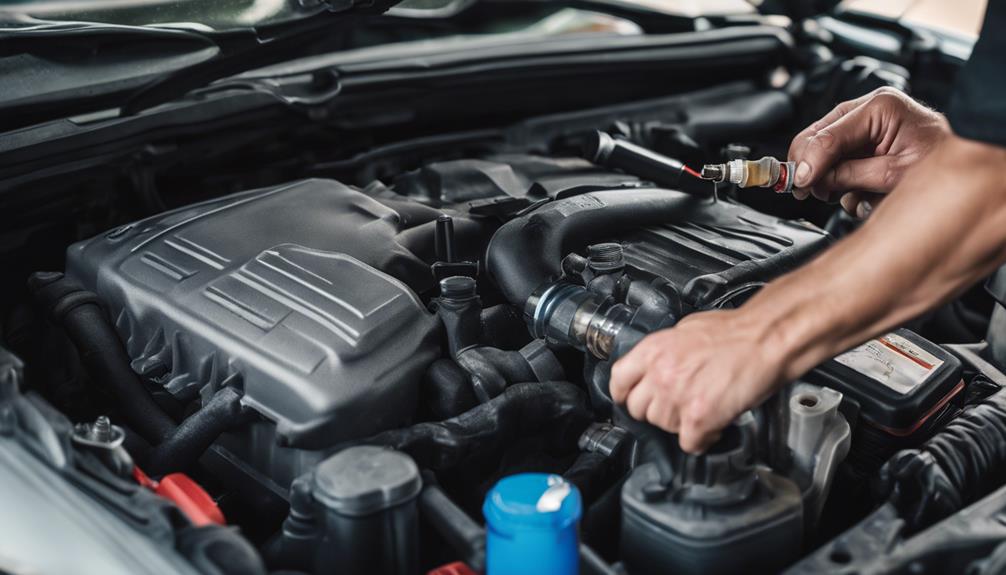
Fluid inspections are essential for maintaining your Toyota Camry's performance and longevity. Ignoring these can lead to costly repairs and embarrassing breakdowns. Think of it as your car's wellness check-up, but without the awkward small talk.
Here's what you need to keep an eye on:
- Engine Oil: Keeps things running smoothly. No oil, no go.
- Coolant: Your car's version of a spa day. Prevents overheating and keeps the engine cool.
- Transmission Fluid: Guarantees your gear shifts are as smooth as your dance moves.
- Brake Fluid: Crucial for stopping power. Because stopping is just as important as going.
Regular fluid inspections every 5,000 to 10,000 miles help catch leaks, contamination, or low levels before they become significant problems.
Brake Service
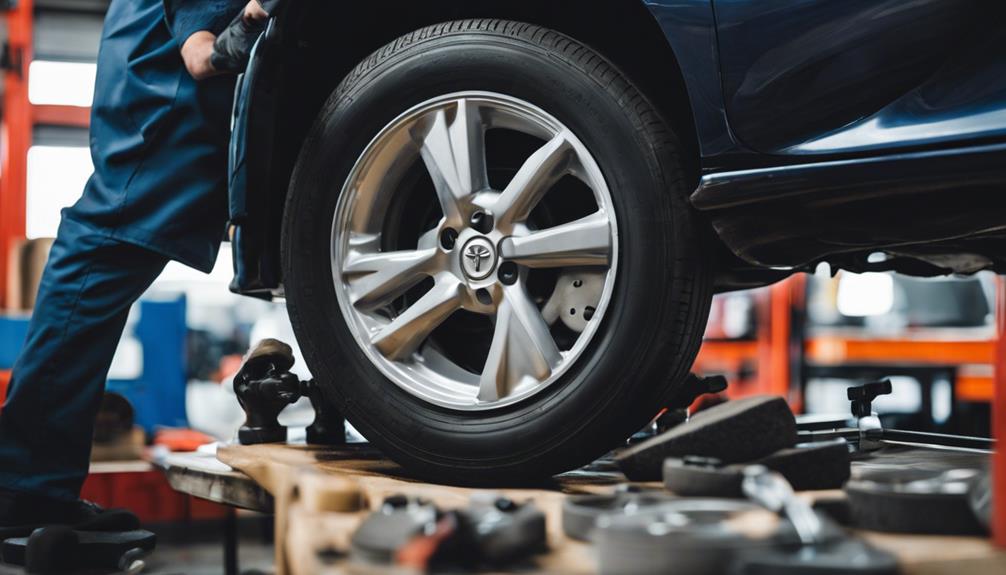
When it comes to brake service for your Toyota Camry, understanding the inspection and replacement cycle is essential.
You'll typically spend between $150 to $300 annually, depending on labor rates and part quality.
Regular maintenance and timely inspections can prevent more costly repairs down the road.
Inspection and Replacement Cycle
You should inspect your Toyota Camry's brakes every 10,000 to 15,000 miles to make sure they perform at their best and keep you safe. Brakes are like your car's best friends—they keep everything in check and save you from unexpected surprises.
To avoid the dreaded brake squeal symphony, follow this inspection and replacement cycle:
- Brake Pads: Replace every 30,000 to 50,000 miles. Your ears and wallet will thank you.
- Rotors: Resurface or replace every 50,000 to 70,000 miles. Think of it as a spa day for your car.
- Brake Fluid: Flush every 30,000 miles. Keeps everything running smoothly.
- General Inspection: Check every 10,000 to 15,000 miles. Prevents small issues from becoming big problems.
Keep those brakes in top shape!
Cost and Labor Involved
Understanding the cost and labor involved in brake service for your Toyota Camry can help you budget and plan for essential maintenance. You're looking at $150 to $300 to replace those brake pads—ouch, right? Labor costs alone can add another $70 to $100 per axle. And if your rotors need some TLC, expect an additional $150 to $300 per axle.
Considering a DIY approach? Brake pad replacement kits cost just $20 to $50 per axle. Think of all the pizza you could buy with those savings! Regular inspections can save you from bigger bills and keep your Camry stopping on a dime. So, keep those brakes in check and your wallet a bit fuller!
Battery Replacement
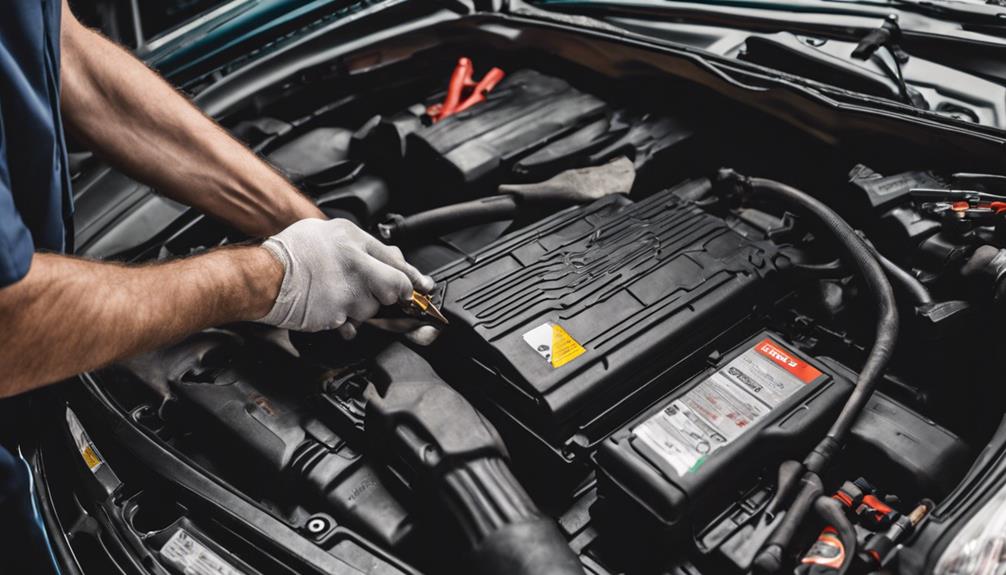
Replacing the battery in your Toyota Camry generally costs between $200 and $300. Ensuring it's an OEM part can guarantee peak performance. While your wallet might cringe at the thought, remember batteries typically last 3 to 5 years.
You could channel your inner mechanic and tackle the job yourself, but make sure you've got the right tools and a YouTube tutorial at the ready!
Cost: $200-$300 for the battery; priceless for your peace of mind.
Lifespan: 3-5 years, unless your car has a secret nightlife.
DIY Factor: Save on labor costs if you don't mind a bit of elbow grease.
Maintenance Tip: Clean those terminals and check the voltage to keep things sparking!
Air Filter Replacement
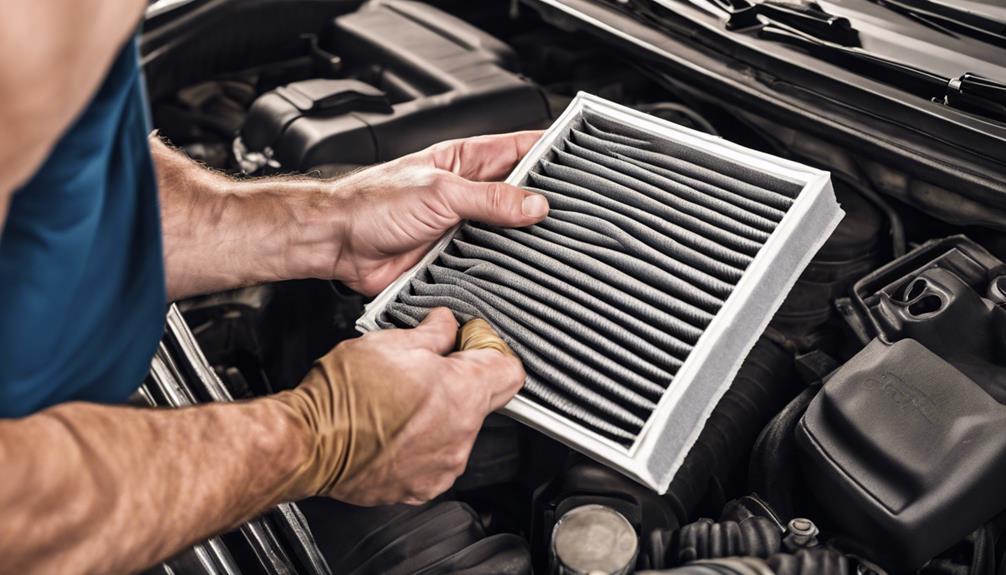
Swapping out the air filter in your Toyota Camry is a straightforward task that can keep your engine running smoothly. Think of it as giving your car a refreshing change! With an average cost of $25 to $75, it's not going to break the bank. Plus, doing it yourself can save you labor costs and perhaps even a trip to the mechanic.
You should change the air filter every 15,000 to 30,000 miles, but if you're driving through a sandstorm, maybe a bit sooner! A clean air filter boosts fuel efficiency and engine performance, plus it helps extend your engine's life.
Spark Plug Replacement
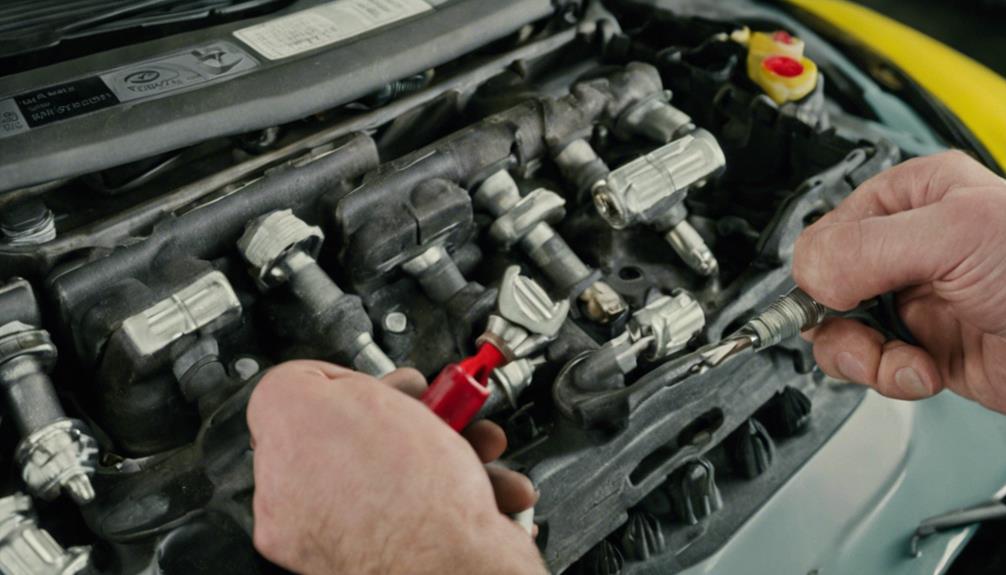
When contemplating spark plug replacement for your Toyota Camry, you'll need to take into account how often to replace them and the associated costs. Depending on the type of spark plug, replacement is typically needed every 30,000 to 100,000 miles.
Regular maintenance not only helps with fuel efficiency and engine performance but also prevents ignition issues.
Replacement Frequency
Spark plugs in your Toyota Camry should be replaced every 30,000 to 100,000 miles to maintain peak engine performance. Think of it as your car's version of a spa day—without the cucumber slices.
Keeping up with this schedule can save you from the dreaded engine misfire and those awkward 'why is my car shaking?' moments. Here's why you don't want to skip this:
- Improves fuel efficiency: Your wallet will thank you.
- Prevents engine misfires: Avoid those embarrassing roadside breakdowns.
- Enhances engine performance: Feel that smooth, satisfying purr.
- Saves on costly repairs: A stitch in time saves nine, or in this case, a spark in time saves a dime.
Don't wait—your Camry deserves this TLC!
Cost Factors
Now that you know when to replace your spark plugs, let's break down the costs involved in keeping your Toyota Camry running smoothly. Expect to shell out $100 to $200 for a professional replacement.
But hey, if you're feeling adventurous and want to impress your friends with your newfound mechanic skills, a DIY kit will only set you back $30 to $60.
Performance Benefits
Replacing your Camry's spark plugs regularly can greatly enhance fuel efficiency and engine performance. Think of it as giving your car a morning espresso shot—it just runs better!
Spark plugs play an important role in igniting the air-fuel mixture in your engine. When they're worn out, your Camry might feel sluggish, like it's running on a Monday morning without coffee.
Here's why you should care:
- Better Fuel Efficiency: Save money at the pump.
- Smooth Acceleration: No more embarrassing stutters at green lights.
- Avoid Engine Misfires: Keep your engine purring like a content cat.
- Longer Engine Life: Because who wants to deal with expensive repairs?
Belt and Hose Checks
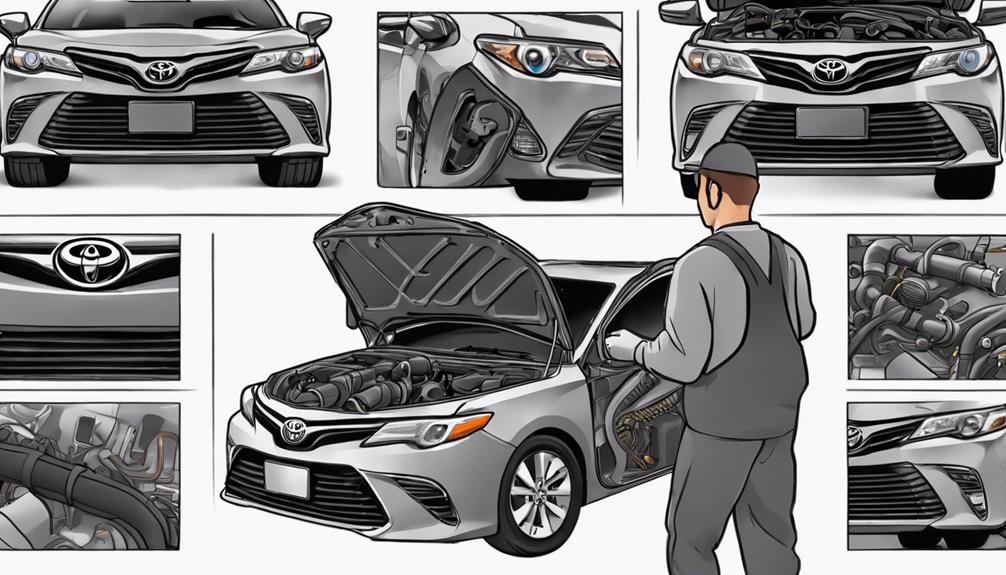
Regularly checking the belts and hoses in your Toyota Camry is crucial for preventing severe issues like overheating or engine failure. Think of these components as your car's unsung heroes—without them, you're stuck on the side of the road, waving at passersby.
Timing belts, costing between $250 to $800, maintain your engine's rhythm. Serpentine belts, ranging from $75 to $200, make sure everything runs smoothly. Hoses, the veins of your car, need regular TLC too, with inspection and replacement costs varying from $50 to $250.
Stay on top of these checks, and your Camry will thank you by not turning into an expensive lawn ornament.
Average Maintenance Costs
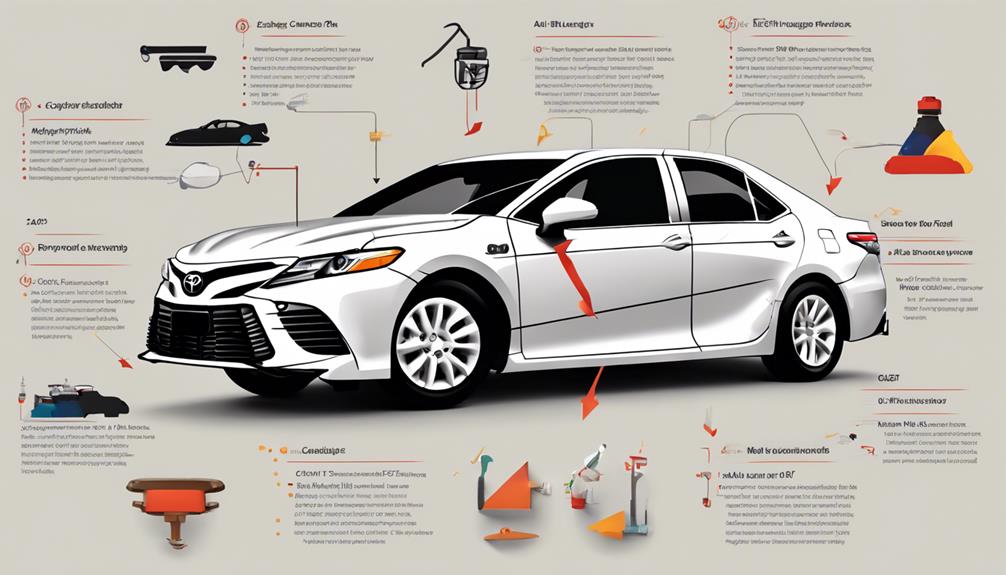
When budgeting for your Toyota Camry, you can expect average annual maintenance costs to be around $420. Over a decade, that adds up to roughly $4,203, which means you can buy a lot of coffee instead of spending it on repairs! Your Camry actually beats the industry average for popular sedans by $2,893.
Here's a quick breakdown to keep things clear:
- Annual cost: $420 (less than your Netflix binge-watching budget)
- 10-year total: $4,203 (still cheaper than your gym membership you never use)
- Chance of major repair: 11.89% (better odds than winning the lottery)
- Aging vehicle costs: Will increase (like the price of avocados)
Frequently Asked Questions
How Often Should the Transmission Fluid Be Changed in a Toyota Camry?
You should change the transmission fluid in your Toyota Camry every 60,000 to 100,000 miles. Think of it like a spa day for your car – it'll thank you with smooth shifting and fewer tantrums.
Ignore this, and your Camry might throw a fit, leading to costly repairs.
What Are the Signs That My Toyota Camry Needs an Alignment?
You know your Camry's alignment is off when it feels like it's auditioning for a dance-off. If it pulls to one side, your steering wheel's off-center, or you feel vibrations like you're on a roller coaster, it's time for an alignment.
Squealing tires, especially around turns, are your car's way of screaming for help. Keep it straight and smooth by checking alignment regularly.
Are There Any Common Recalls for Recent Toyota Camry Models?
Oh, you're wondering about Camry recalls? Well, you're in luck! Recent models haven't been too dramatic, but they've had their moments. Think of it as Toyota's way of saying 'We care!'
Common recalls include software glitches and fuel pump issues. Don't worry, though; Toyota's got your back. They'll send you a love note (a recall notice) to fix it for free.
Consider it a spa day for your car!
How Can I Improve My Toyota Camry's Fuel Efficiency?
A penny saved is a penny earned! To boost your Toyota Camry's fuel efficiency, keep your tires properly inflated; it'll save you gas money.
Use the recommended motor oil, and change the air filter regularly. Ditch aggressive driving habits; your car and wallet will thank you.
Plan your routes wisely and consolidate errands. It's like giving your Camry a spa day, but for fuel efficiency!
Is It Necessary to Service the Air Conditioning System Regularly?
Absolutely, you should service your Camry's air conditioning system regularly. Think of it like a spa day for your car—keeps it cool and happy.
Skipping it could turn your car into a sauna and your wallet into a desert. For around $100 to $150 every couple of years, you avoid costly repairs and make sure you're not sweating bullets in traffic.
Conclusion
When it comes to maintaining your Toyota Camry, staying on top of oil changes, tire rotations, and fluid inspections is essential.
Don't forget about brake service, battery replacement, and air filter swaps.
Regular spark plug changes and belt and hose checks will also keep your car purring like a kitten.
All these steps guarantee your ride remains smooth and reliable, giving you peace of mind and saving you from a potential wallet-busting 'breakdown.'

